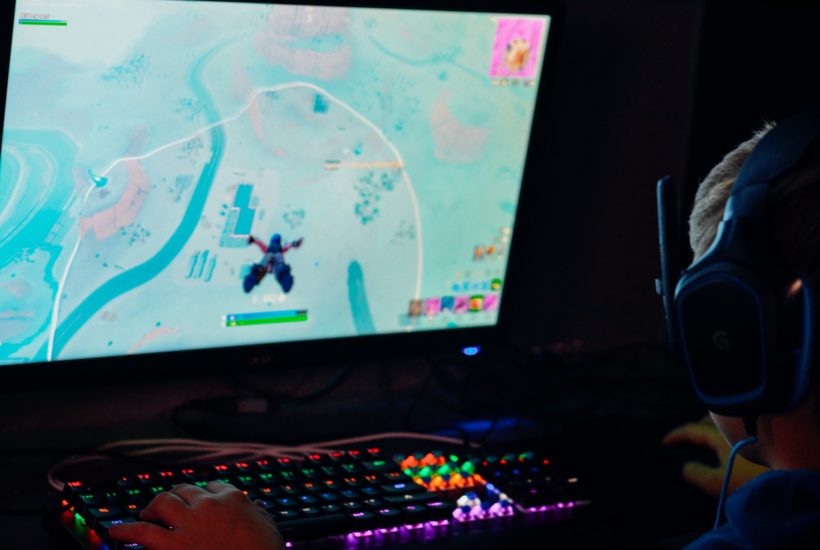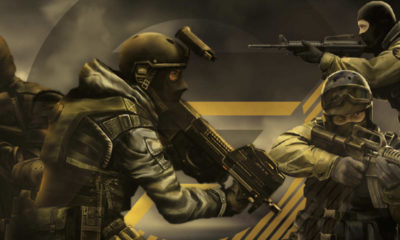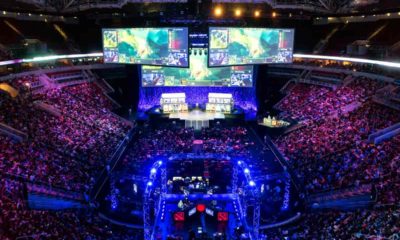Business
Esports stars burn bright, but risk going out fast, gaming career insights
Esports is a rapidly growing industry bridging the gap between digital and entertainment sectors; its star gamers are often young, but stand to make fortunes. Their careers do not tend to last long however, and success requires many traits found in more conventional athletes. Perhaps that is why Formation, a platform set up by contact sport athletes has so much to offer the esports community?

The esports industry is booming. With an estimated $4.5 billion invested in 2019, the industry’s size and economic impact have grown exponentially. Its unique niche, somewhere between sport, gaming and entertainment gives it a privileged position for growth in the years to come. Growth which has hardly been slowed by the pandemic.
Despite some tournaments delayed, esports stars continue to compete for prizes that reach into the millions of dollars. These stars rise fast, but run the risk of fizzling out all too quickly. Nevertheless, hundreds of thousands of hopefuls compete across the most competitive games to join their ranks, helping to explain the success of esports platforms like FORMATION.GG, which caters to the ever growing community.
Millions on the table for the top esports ‘athletes’
Esports has grown exponentially as an industry, reaching greater audiences and locking in larger apparel, gaming, and casino sponsorships every year. In fact, from 2012 to 2019, the prize pools for esports tournaments rose from just $13.8 million to over $215 million in 2019. That is roughly… 1400%? And these prize pools are just the tip of the iceberg of revenues, incomes, and profits spread across the industry. But they are certainly enough to attract legions of hopeful players.
Yet at the visible tip of this multi-billion dollar industry sit a few celebrity players: mostly male and mostly in their late teens. According to some estimates, the average esports player’s career lasts less than a decade, from about 17 years old to somewhere in their mid to late 20s. After that they are either too old to compete with younger generations… or are burned out by the tiring, all-consuming lifestyle. Sound familiar? It’s remarkably similar to the career path followed by many pro-athletes, especially in the rougher domains of contact sports like Rugby, MMA or American Football.
Most of the highest-paid esports players are barely out of their 20s, and some still in their teens. Contracts are signed early for the most promising hopefuls, who are then brought up in a carefully curated environment to prepare them for excellence. But this is not an environment open to all, and one of the driving factors behind the creation of the esports platform FORMATION.GG where players could independently meet, train, play and show off their skills… as well as win prizes. Community can also help protect professional players from some of the risks of their industry.
Esports athletes are teens in a hard-hitting competitive environment
Contact sports are (in)famous for being meat grinders for their players—injuries are common and build up over time. While esports athletes may not have to face concussions or torn ligaments, the physical toll of their jobs can be harsh. Long days (14 hours of training are common) combined with media attention, high stakes, repetitive motion and lack of action can take their toll on both mind and body. A toll which contact sport veterans like those who launched Formation.gg understand all too well.
While the debate continues over whether a 28-year-old can be as quick as an 18-year-old, the truth is that most cannot, or do not wish to, keep up with the grueling life of pro-players past their mid 20s. Having to train all day, often far from friends and family, just to keep up with the skills required to earn the ever more significant prizes. The best often train more than 10s per day—a schedule even many pro athletes might baulk at. This makes relationships, family, even friendships outside the highly competitive world of esports quite limited. Burnout is common, mental illness unfortunately also far too prevalent among such a vulnerable age group.
Early mistakes can also follow skilled players, haunting them. Take the Finnish 19-year-old Jamppi, an international rising star in the CounterStrike world. His unfortunate decision to sell an account in his youth, which then was flagged for cheating, got him banned from the top echelon of competition. Even as he battles CS:GO’s parent company Valve in courts for the right to compete in the majors (where the prizes become really lucrative), the young man must face a difficult decision. Stay with the game that helped bring him fame, or switch to a different, newer title where he would have to struggle to catch up, but could earn far more lucrative prizes like Riot Games’ VALORANT?
What can esports athletes do after their gaming career?
While a decade or two may seem like a short span for a career, it is a high intensity one. And when finished with their time in the spotlight—or their attempt to grab it—has ended, esports athletes have important decisions to make ahead of them. The most successful, of course, barely have to worry. Their fame or savings gives them enough clout to coast if they want to, or to build other successful projects under their own momentum.
Some will have been able to study enough to move on to more traditional careers, but many will choose to remain in the industry they grew up in. After all, they have lived, breathed, and played it for most of their formative years. As with conventional athletes, they might stay on as trainers, coaches, commentators, or organizers. After all, they are experts in the field. Here they can earn solid salaries as part of the growing cohorts who bolster the burgeoning industry.
Others might try for another more lucrative, though equally risky, career path in gaming, streaming games via online platforms like Twitch, Youtube or Formation. The highest paid streamers can make millions as well, and good ones can make a living. But streaming games is far more on the entertainment side than esports, which emphasises skill and results over charisma or wit. Those who succeed may even do better in the entertainment world, though for each that does, many more will fail and fade into memory.
Building an esport community for athletes and amateurs alike: FORMATION.GG
All the impediments and challenges, while weeding the weak from the worthy, do not seem to deter hopefuls. Each year millions of gamers now compete in formal or informal tournaments to strive towards the top places in their respective games. Add to this the growing number of esport titles on mobile devices, bringing legions more players with each release, and the field becomes truly daunting.
Finding a place to compete can be incredibly difficult, yet building a community to compete with (and alongside) can go a long ways to help eliminate some of the risks of the high stakes esport athlete lifestyle. A lesson physical sport athletes learned long ago, where team building is a priority; where junior and amateur leagues help funnel the best to the top while propping up the rest. These athletes are happy to share their experience with their esport colleagues, however large the divide might seem between the two industries.
The efforts of a collaboration between some of these athletes (professional and amateur rugby players) with esport insiders and industry leaders has led to the launch of a bold new platform and community: FORMATION.GG. The innovative approach combines ease of access and entry with tournament organization and tracking, letting aspiring athletes compete in a wide range of esports games across all the growing titles. With real prizes on the line for sponsored tournaments, athletes can show off their skill and start to make their name, while esport athletes (or veterans) can work their brands by organizing their own.
As the industry continues to grow, we expect to see more such innovations build on the strengths and combat the weaknesses of the esports sector. Just as we expect to see more brilliant esport stars rise, and fall, in this dynamic and entertaining new digital world.
__
(Featured image by Alex Haney via Unsplash)
DISCLAIMER: This article was written by a third party contributor and does not reflect the opinion of Born2Invest, its management, staff or its associates. Please review our disclaimer for more information.
This article may include forward-looking statements. These forward-looking statements generally are identified by the words “believe,” “project,” “estimate,” “become,” “plan,” “will,” and similar expressions. These forward-looking statements involve known and unknown risks as well as uncertainties, including those discussed in the following cautionary statements and elsewhere in this article and on this site. Although the Company may believe that its expectations are based on reasonable assumptions, the actual results that the Company may achieve may differ materially from any forward-looking statements, which reflect the opinions of the management of the Company only as of the date hereof. Additionally, please make sure to read these important disclosures.

-

 Crypto2 weeks ago
Crypto2 weeks agoCaution Prevails as Bitcoin Nears All-Time High
-

 Africa6 days ago
Africa6 days agoBridging Africa’s Climate Finance Gap: A Roadmap for Green Transformation
-

 Biotech2 weeks ago
Biotech2 weeks agoEcnoglutide Shows Promise as Next-Generation Obesity Treatment
-

 Business4 days ago
Business4 days agoThe TopRanked.io Weekly Digest: What’s Hot in Affiliate Marketing [uMobix Affiliate Program Review]

























